FSD Panel Discussion: Digital Technology for the Benefit of Smallholder Farmers
On the 20th of May, the Fair & Smart Data spearhead held a panel discussion with experts from the industry, academia, and non-profit sector, namely:
- David Gerbrands, Global Head Agri and Banking Advisory at Rabobank
- Mariette McCambell, Consultant and Researcher at Wageningen University & Research
- Frederik Claasen, Head of Policy at Solidaridad
- Nik Baerten, Founder & Future Explorer at Pantopicon
The hybrid event (online and in-person) had diverse attendance from SBE and BISCI, students and researchers from UM, and professionals and activists from the field. The guiding question of the event was “how can we empower smallholder farmers in the Global South to use data technology tools to compete in the digital economy?”
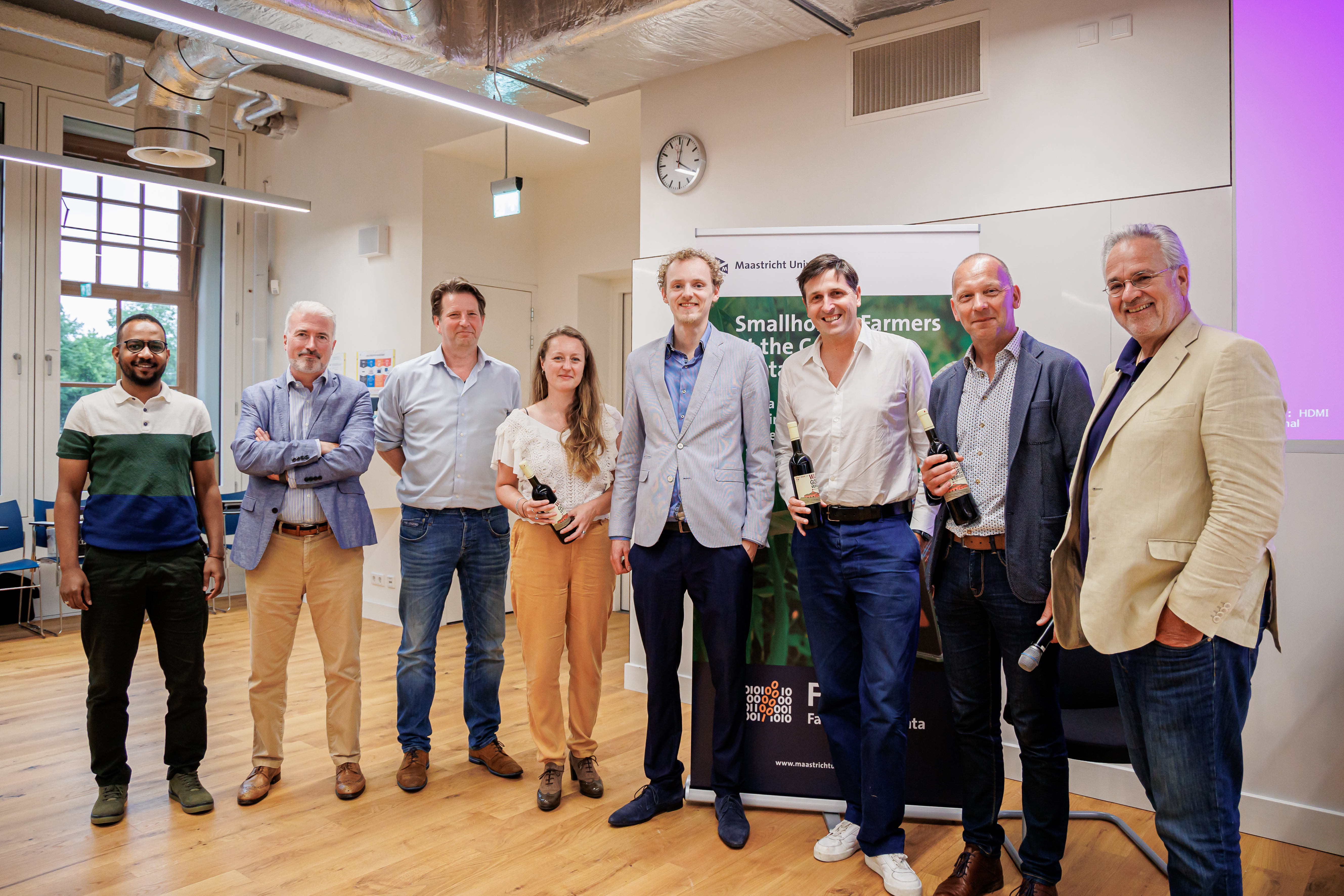
Part 1: Introductory presentations by the panellists
The event started with an introduction of the FSD spearhead to the audience by the programme lead Ron Cörvers, who moderated the session together with Sidi Amar. The brief introduction was followed by a ten minutes presentation by each panellist explaining their work and area of expertise and how they relate to the topic at hand.
Digital inclusion is key.
The issue of digital inclusion for smallholder farmers was raised by Mariette McCambell in her presentation. She pointed out some key considerations related to data infrastructure that need to be addressed first when talking about digital inclusion such as:
- How data is collected and why? How is data aggregated and who can use it? Is the collection/use of data deliberate? Is it beneficial to all stakeholders?
- Are the users even ready? It is a prerequisite to consider building capabilities, opportunities, and motivation for and on behalf of the farmers.
- It is important to build capacity across all sectors, not just for farmers (co-design and integration).
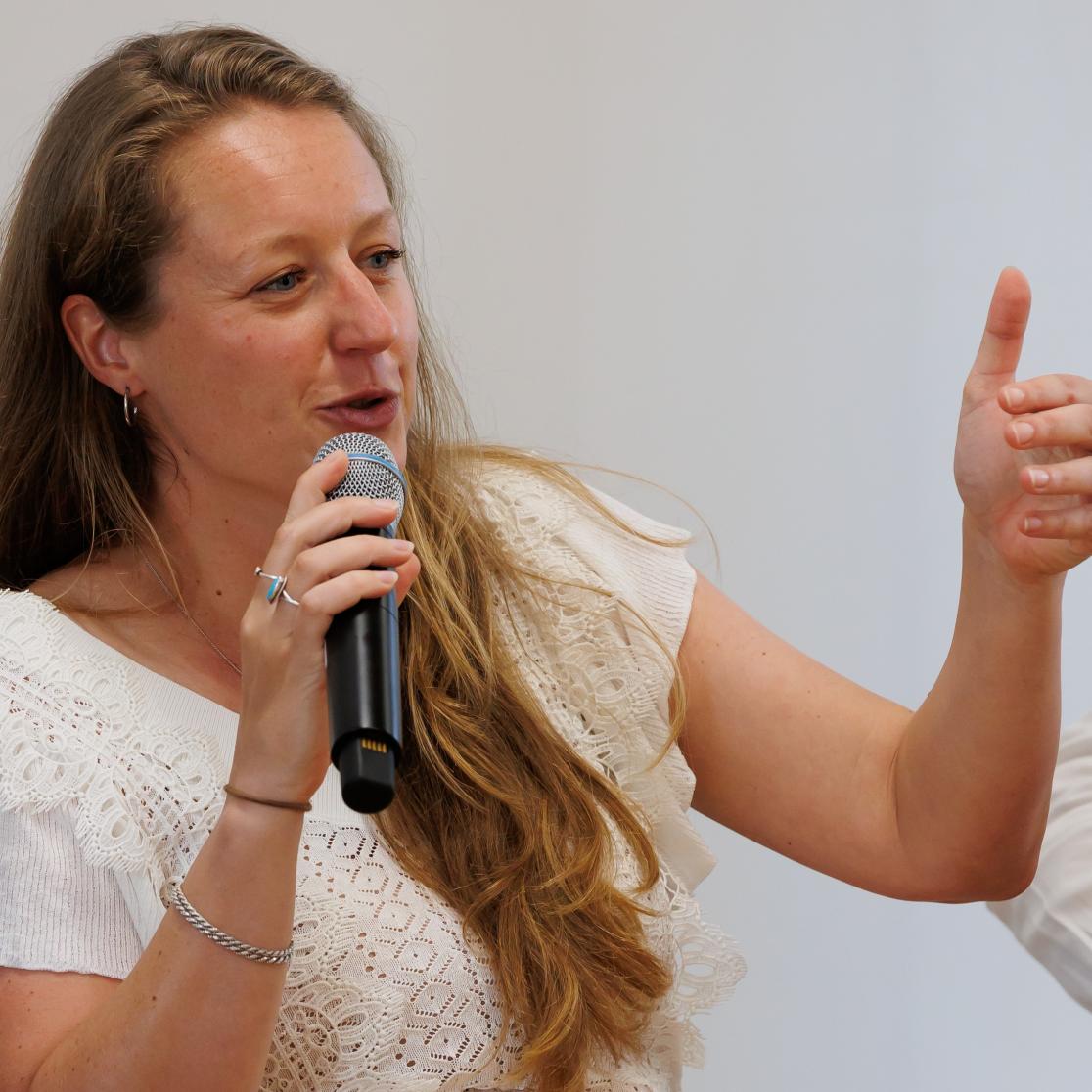
Smallholder farmers need incentivisation.
The head of policy at Solidaridad Frederik Claasen focused more on the status quo and the current trends in smallholder agriculture, stating: “For farmers, becoming part of the data ecosystem is a license to operate.” Digital inclusion will grant an entry point for the new generation of farmers, and it should be a requirement for the players operating in the ecosystem.
First, he highlighted the current challenges of implementing digital solutions such as the coverage and costs of projects, digital illiteracy, the ageing population of smallholder farmers (average age is 52), increased demands for data collection, regulations, etc.
Second, he emphasized the importance of promoting new data technologies in smallholder farming to make it attractive for the young generation through a “pulling” approach that provides incentives for farmers to join by themselves instead of a “pushing” approach that demands their participation.
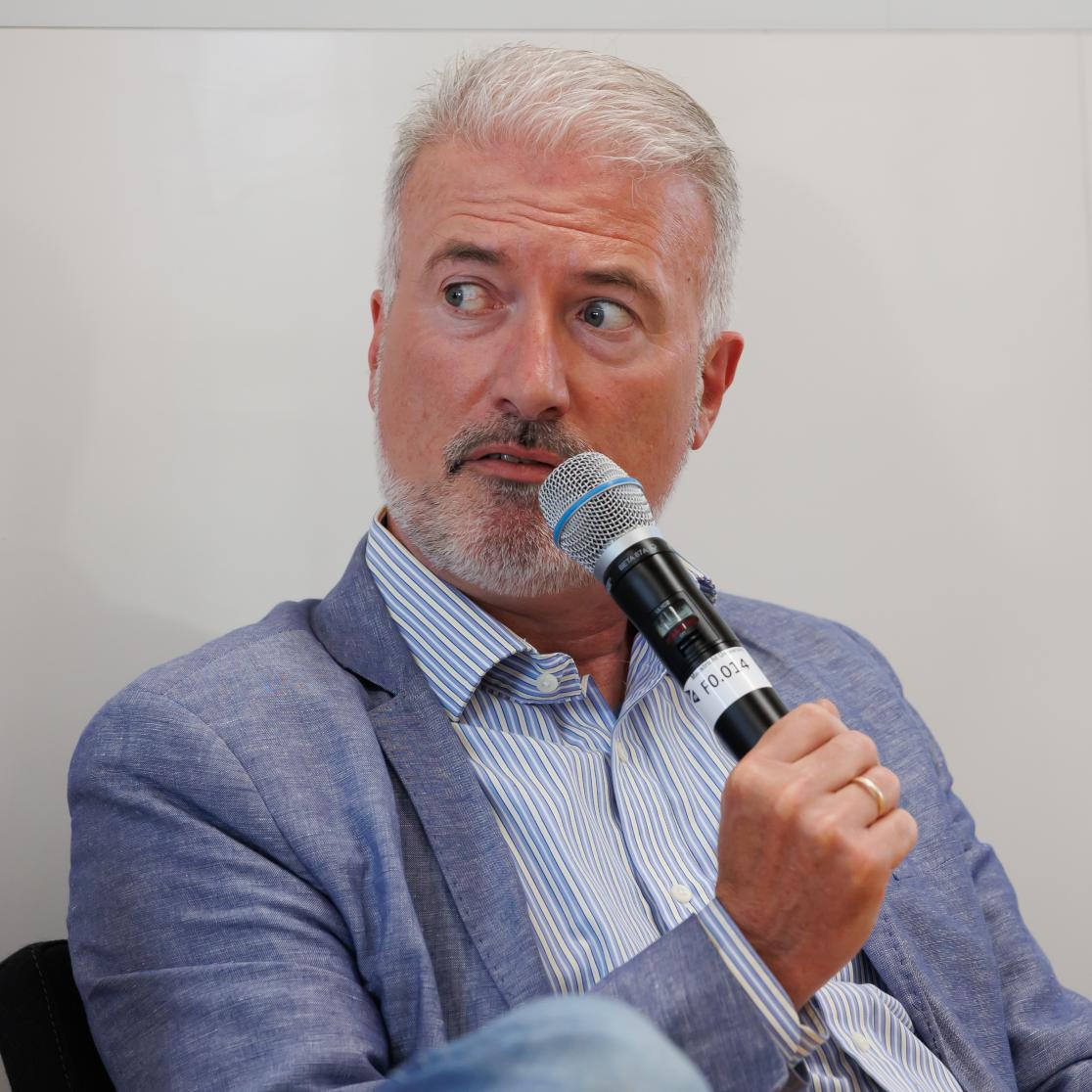
Data is making smallholder farmers bankable!
David Gerbrands from Rabobank mentioned in his presentation that just a decade ago, smallholder farmers were not considered bankable by the financial sector, whereas now they are sought after by big banks. This change is due to the advent of digital solutions. He added that value chains are not generally functioning well for smallholder farmers, as they still need access to fair markets and financial opportunities to amend the productivity gap. In this context, he gave two examples of data-driven projects that Rabobank Partnerships is implementing for smallholder farmers: Acorn and Agriculture Exchange.
Through Acorn, Rabobank is trying to improve the living conditions of smallholder farmers while combating climate change through carbon sequestration. As for Agriculture Exchange, Rabobank in partnership with Mastercard is working on creating a digital marketplace for smallholder farmers. This platform could trace the transactions of the farmers, hence, creating financial records that will allow them access to credit. In praising these efforts, David did not forget to mention the challenges related to cost-effectiveness and scalability.
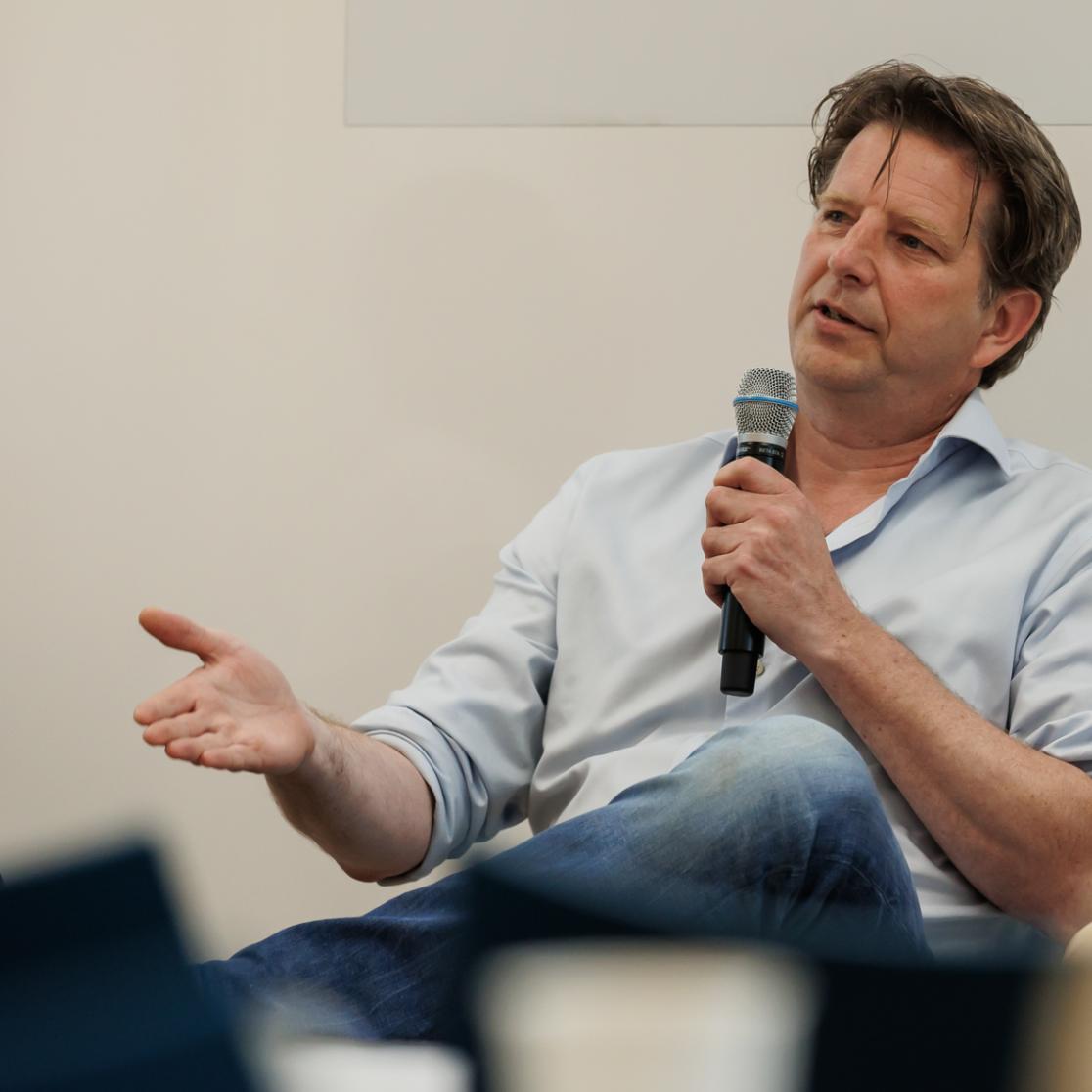
Digital identity is a precursor.
Nik Baerten founder of Pantopicon pointed out in his introductory presentation that digital identification is a precursor when discussing anything related to digitalisation for smallholder farmers; especially in the Global South (1 billion people and 1 out of 4 children do not have verifiable official proof of identity). He highlighted also that digital IDs would unlock new opportunities for smallholders beyond the agricultural value chain.
He insisted, like the other speakers, on the importance of involving the farmers at all the stages of data-driven projects – not only at the production stage but also at the decision-making. Invoking the altruism dimension, Nik pointed out that we should ask the following questions when implementing new digital solutions to guarantee shared benefit to all stakeholders in the ecosystem and beyond:
- Who benefits beyond the provider and the user, and how?
- Which other costs are generated and where?
- Which other challenges beyond the intended one does the solution help to tackle?
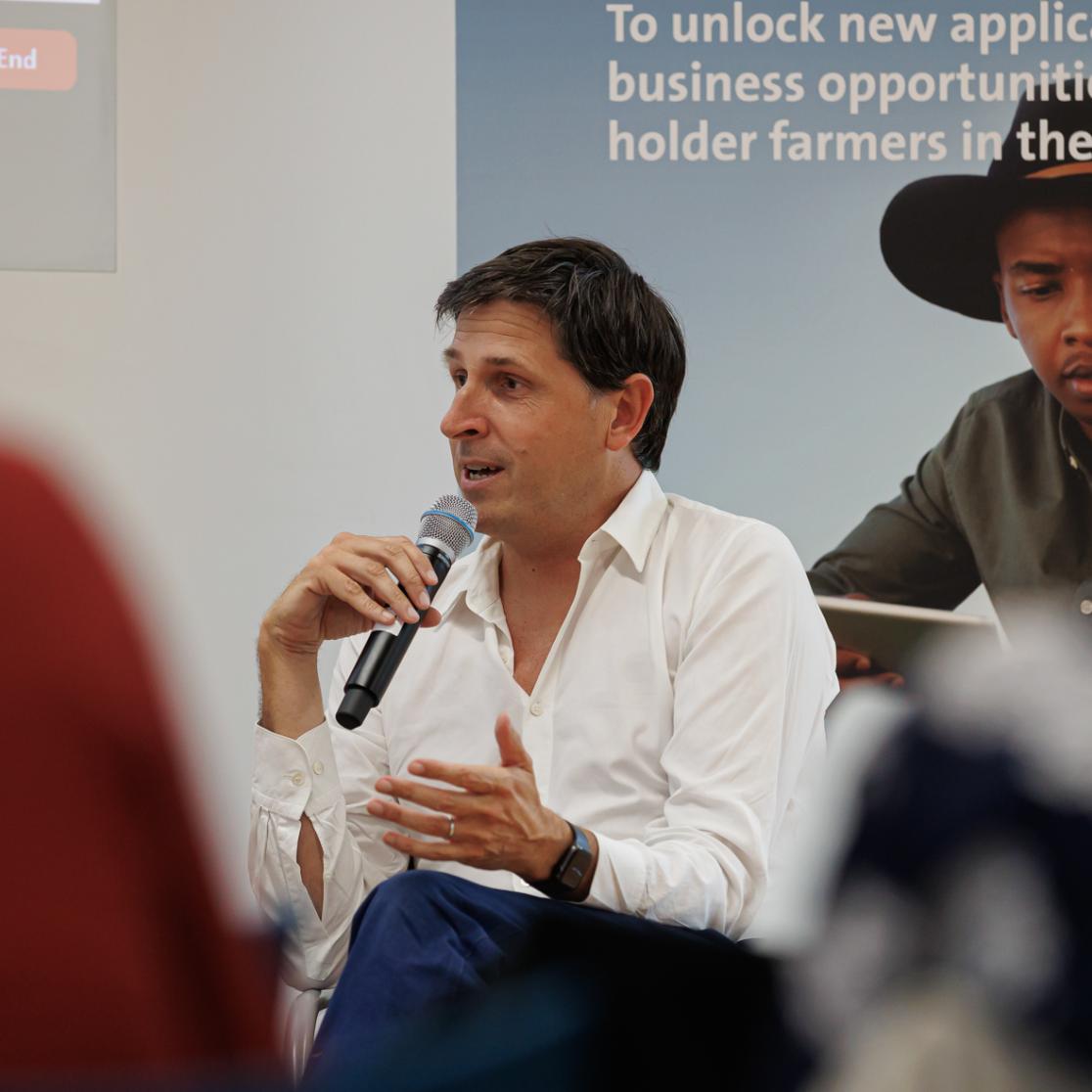
Part 2: Panel discussion
The second part of the event was dedicated to the panel discussion where the FSD moderators and the audience had the opportunity to ask the panellists their questions. The discussion was organised into three topics each having a few central questions.
- Topic 1: Technology and Innovation Trends for Smallholders: What is New? Go Big or Go Frugal with Innovation?
- Topic 2: Value for Data: Data-driven Business Models for Smallholders ─ What Are the Obstacles and Opportunities and How to Scale Up?
- Topic 3: Infrastructure for Promoting Inclusion and Participation of Smallholder Farmers in the Digital Economy: (a) Promotion of Digital Literacy: What Is the Right Approach? (b) Digital ID for Smallholder Farmers: The Success and Challenges?
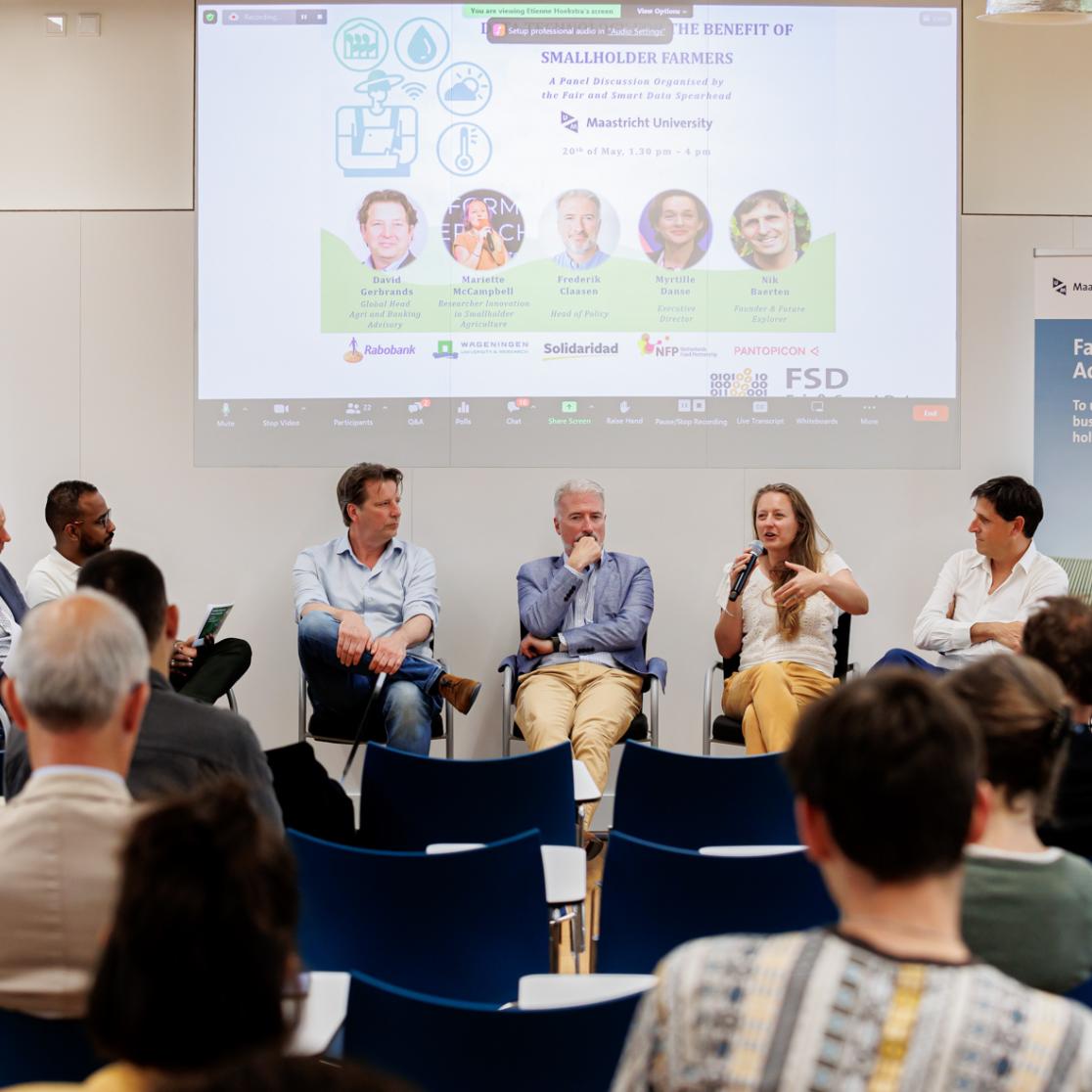
In their discussion, the panellists had nuanced contextual answers. Below is a recap of some of the information and insights shared by the panellists.
What technology has the greatest potential to be adopted by smallholder farmers?
Although remote sensing could tremendously facilitate the collection of farm data, many technologies comprise tools that could revolutionise food production and should be used for more than just one goal. With this answer, the panellists asserted that technology is a means to an end and the adoption generally depends on the business case (e.g., 29 applications at Solidaridad)
What is the role of the farmer?
There was a consensus among the speakers that any data-driven project should guarantee the involvement of farmers in the design stage and the functional control of their data. However, the issue with this type of projects is that the benefits (e.g., better yields) are not immediate, so the incentives should be clear which could increase the cost and obstacles to the implementation.
Another aspect that was highlighted in the discussion in relation to the incentivisation is the ageing population of low-income farmers – How do you make agricultural activities more lucrative and appealing to younger generations and hence prevent rural exodus? Maybe digitalisation is the solution!
Could frugal innovations be the solution?
When the question of the availability of frugal innovations that are indigenous to the ecosystem of smallholder farmers was raised, some panellists clarified that the origin of technology should not matter if it is useful and implementable. Examples of technologies that were pioneered in the Global South were invoked here such as mobile payments, which create an opportunity for a South-to-South exchange of technology and knowledge.
In the case of expensive technologies, the suggestion was to let companies do the installation and analysis (e.g., drone harvesting, AI, ML) and make it easy for farmers to operate (e.g., only send them simple instructions via small text message since phones are already available).
What are the smallholder-oriented business models and their associated risks?
When it comes to business models, many valid points have been made about the need for frontrunners since the risks of investment are still exceedingly high given the lack of financial records and assets on the part of smallholder farmers. Another issue in this context was the definition of value for smallholder farmers. For instance, in the case of carbon farming, should the project owner pay for the farmers’ data or carbon credits or both? Should it be monetary or in other forms (training, buying equipment, providing utilities, etc.)? An answer could be to let the farmers decide where and how they want to create value.
Additional interesting points:
- Some smallholder farmers do already collect data in non-digital ways, but the created value is very low. Helping them digitise the process of data collection would be beneficial to all the stakeholders in the operation.
- Agricultural resilience in the Global South often stems from communal efforts, which could be jeopardised if external organisations put emphasis on individual farmers instead. Moreover, in those poor rural communities, food security should be prioritised over cash crops.
- Digitalisation efforts in smallholder farming should go beyond technology adoption to seek behavioural and practice changes. Another aspect that should be accounted for also in this area is knowledge spill-over. For instance, once technologies are adopted and prevalent, farmers might abandon their fields for more lucrative businesses.
Rewatch it here
Also read
-
DigiMach places Meuse-Rhine Euroregion at the heart of industrial digitalisation
DigiMach (Digital Machining) is a new cross-border project uniting Belgium, Germany, and the Netherlands around a common goal: accelerating the digitalisation of the machining industry in the Meuse-Rhine Euroregion.
-
Globalisation & Law Network seminar with Áine Ryall
On 24 November 2025, the Globalisation & Law Network, together with the Institute for Globalisation and International Regulation (IGIR) held the seminar with Professor Áine Ryall.
-
Guest Lecture: Lóránt Havas explores current challenges in the EU’s CFSP
Lóránt Havas delivered a guest lecture on the EU’s evolving CFSP, discussing key legal developments, institutional challenges, and new defence instruments.